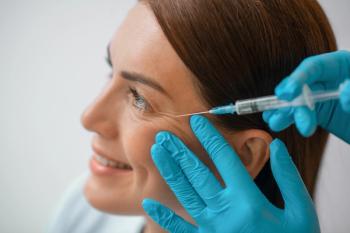
- Dermatology Times, December 2021 (Vol. 42. No. 12)
- Volume 42
- Issue 12
What to Know: Phase 3 Findings on Promising Psoriasis Pipeline
Key Takeaways
- Tapinarof cream and roflumilast are effective topical treatments for psoriasis, offering alternatives to steroids with fewer adverse effects.
- Deucravacitinib, an oral TYK2 inhibitor, shows high efficacy in achieving PASI 75 and avoids common JAK inhibitor side effects.
Mark G. Lebwohl, MD, presents on what dermatologists need to know about the newest psoriasis studies during the Fall Clinical Dermatology Conference.
Three psoriasis drugs—2 topicals and 1 oral—are promising investigational treatments and, if FDA approved, could become important options, according to Mark G. Lebwohl, MD, professor of dermatology at the Icahn School of Medicine at Mount Sinai in New York, New York, and an editorial advisory board member for Dermatology Times®. Lebwohl presented the phase 3 trial results during the 2021 Fall Clinical Dermatology Conference held October 21 to 24 in Las Vegas, Nevada, and virtually.1
“Topicals are used by every patient with psoriasis, whether their condition is mild, moderate, or severe,” Lebwohl said. “Only about 20% of patients with psoriasis are ideal candidates for biologics, and, of that total, a proportion of patients will achieve psoriasis area and severity index [PASI] 75 or 90. That still leaves 10% to 25% improvement to reach clear or almost clear, so there’s a major need for more topicals, particularly nonsteroids.”
PSOARING 1 (NCT03956355) and PSOARING 2 (NCT03983980) are identically designed studies looking at use of tapinarof cream (GSK2894512; Dermavant), a once-daily topical aryl hydrocarbon receptor agonist.
The 12-week, double-blind, placebo-controlled trials showed that 20% of patients with mild disease, 40% with moderate plaque psoriasis, and 36% with severe disease responded to the topical. Body surface area affected—whether more or less than 10%—had no impact on results, with more than 35% of patients responding to tapinarof, according to Lebwohl.
“Whether the patient had psoriasis for less than 5 years, 5 to 10 years, or more than 10 years, the response rate fell between 35% and 39%,” Lebwohl said. “[Male and female patients] responded similarly. Interestingly, patients older than 65 responded a little bit better than younger patients. Of the responders, the proportion of patients that were clear was 40.9%. The proportion of patients that were clear or almost clear with a 2-grade improvement was 58%.
“Tapinarof appeared to be as effective as high-potency steroids without their adverse effects,” Lebwohl continued. “The data also revealed a durable response. Results lasted 4 months—we’re just not used to that. According to the trial results, tapinarof led to complete clearing even on sensitive skin sites.”
Topical roflumilast (ARQ-151; Arcutis Biotherapeutics), a phosphodiesterase-4 enzyme inhibitor, was shown in phase 3 research to be highly effective and comparable to strong steroids for psoriasis, according to Lebwohl. “Roflumilast was effective to an extraordinary degree for intertriginous psoriasis,” he said. “This is a needed option for patients. We don’t like using steroids in the body folds, the groin, the armpits...so we need a nonsteroid medication, and it turns out roflumilast showed high efficacy in those sites.”
Oral deucravacitinib (BMS-986165; Bristol Myers Squibb) is a tyrosine kinase 2 (TYK2) inhibitor. “Deucravacitinib is considered a Janus kinase [JAK] inhibitor, but unlike the other JAK inhibitors, which can cross-react with one another because they bind to a common binding site on the [JAK] molecule, this one does not,” he said. “This molecule binds to the regulatory domain of TYK2.”
Because the other JAK inhibitors attach to an ATP binding active site, they share certain adverse events. Deucravacitinib appears to avoid those, Lebwohl said.
In one phase 3 study, more than half (53%) of participants taking deucravacitinib achieved PASI 75; in another study, more than 58% achieved that level. About half of those participants were clear or almost clear, according to Lebwohl. “This is an oral molecule, which is an advantage over injections,” he said. “It also works fairly quickly. Most of the benefit is in the first 4 weeks. Deucravacitinib is expected to be approved during 2022.”
In another update, Lebwohl noted that bimekizumab (Bimzelx; UCB), the first dual inhibitor of IL-17A and IL-17F for the treatment of psoriasis, was supposed to be approved in mid-October 2021. However, because of the pandemic, the FDA put off its investigation of the drug’s manufacturing facilities.2
“Bimekizumab is the first biologic we have that in [the] placebo-controlled period of the pivotal trials gave PASI 100 to a majority of patients at the primary end point,” he said. “It is also very fast and durable.”
Some patients with plaque psoriasis could have an additional treatment choice in the near future. Earlier this year, the FDA accepted the supplemental new drug application for apremilast (Otezla; Amgen) to treat mild to moderately severe cases in adults. Apremilast already has FDA approval as a treatment for moderate to severe plaque psoriasis in adults who are candidates for phototherapy or systemic therapy, have active psoriatic arthritis, or have oral ulcers associated with Behçet disease.
“Apremilast appears to be quite safe,” Lebwohl said. “There are plenty of patients with mild to moderate psoriasis on systemic therapies who are doing well but not well enough. This could be an alternative for them. Hopefully, it will come to market next year.”
Disclosures:
Lebwohl is an employee of Mount Sinai and receives research funds from Abbvie, Amgen, Arcutis, Boehringer Ingelheim, Dermavant, Eli Lilly, Incyte, Janssen Research & Development, Leo Pharmaceuticals, Ortho Dermatologics, Pfizer, and UCB, and is a consultant for Aditum Bio, Allergan, Almirall, Arcutis, Avotres Therapeutics, BirchBioMed, BMD skincare, Boehringer-Ingelheim, Bristol-Myers Squibb, Cara Therapeutics, Castle Biosciences, Corrona, Dermavant Sciences, Evelo, Facilitate International Dermatologic Education, Foundation for Research and Education in Dermatology, Inozyme Pharma, Kyowa Kirin, LEO Pharma, Meiji Seika Pharma, Menlo, Mitsubishi, Neuroderm, Pfizer, Promius/Dr Reddy’s Laboratories, Serono, Theravance, and Verrica.
References:
- Del Rosso J, Desai S, Lebwohl M. Clinical dermatology: what you need to know about the newest studies. Fall Clinical Dermatology Conference; October 21, 2021; Las Vegas and virtual.
- Reis J, Vender R, Torres T. Bimekizumab: the first dual inhibitor of interleukin (Il)-17a and il-17f for the treatment of psoriatic disease and ankylosing spondylitis. BioDrugs. 2019;33(4):391-399. doi: 10.1007/s40259-019-00361-6
Articles in this issue
about 4 years ago
Screening for Body Dysmorphic Disorderabout 4 years ago
Clascoterone Cream First Topical to Target Androgen Receptorsabout 4 years ago
2021's Breakthroughs & Disappointmentsabout 4 years ago
Multimodal Plan Combats Combination Rosaceaabout 4 years ago
Muscle Toning and Strengthabout 4 years ago
Race, Ethnicity, Culture All Affect Hair Agingabout 4 years ago
Work Smarter to Manage Occupational Dermatosesabout 4 years ago
Do You Have the Right Financial Adviser?about 4 years ago
6 Steps to Hiring Great Practice Staffabout 4 years ago
Get the Facts on FlakingNewsletter
Like what you’re reading? Subscribe to Dermatology Times for weekly updates on therapies, innovations, and real-world practice tips.











